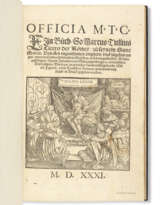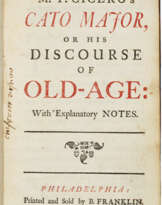ID 993263
Лот 48 | Marcus Tullius Cicero (106 - 43BCE)
Оценочная стоимость
£ 40 000 – 60 000
De Oratore, Orator (part), In Catilinam I and III (part), in Latin, decorated manuscript on paper [Italy, perhaps Tuscany, mid-15th century]
Two seminal texts on rhetoric and one rhetorical extravaganza by the great Roman politician, philosopher and orator Marcus Tullius Cicero, all rare on the market.
287 x 197mm. viii + 110 + i leaves, complete as written, collation: 1-88, 910, 10-118, 126, 137(of 8, viii a cancelled blank), 142, 155(of 6, vi a cancelled blank) gathering signatures, catchwords and sporadic foliation survive, 27-34 lines, written space: c.215 x 135 mm., occasional marginal annotations and manicules, rubrics in red, initials in red throughout, one foliate penwork initial in red opening Book II of De Oratore, occasional spaces for initials left blank, the watermark a letter 'M' matching DE1935-Mscr.Dresd.Ob.13_24 and DE1185-S327_228, Tuscany (Florence or Siena), c.1440 (some marginal foxing, smudging and dampstaining, f.33 almost loose, some gutters reinforced, small paper repairs to ff.16 and 110, else in good condition with wide margins). Bound in 19th-century olive marble paper over pasteboards with a gilt tooled vellum spine (title piece fallen away, small chips to edges of boards).
Provenance:
(1) Bernard Quaritch, Catalogue 176: Catalogue of manuscripts illuminated and historical with a collection of rare bibles and liturgies, 1898, no 15. The description in the catalogue is summary, but it seems to be a match (medium, number of leaves, content, date, localisation and binding).
(2) Charles Edward Harris St. John (1843-1917) of Tylney Hall, Winchfield, Hampshire: his armorial bookplate on front pastedown facing his signature in brown ink. He was a lawyer and Justice of the Peace who also owned a 16th-century volume of verses by Giovanni Guidiccioni (d.1541) addressed to Annibale Caro (d.1566), now Cambridge MA., Houghton Library, MS Typ 1114.
Content:
Cicero, De Oratore ff.1-103: Book I f.1, Book II f.29, Book III f.73; Orator i-iv.16, ff.104-105v, beginning 'Utrum difficilius aut maius esset negare [...] and ending mid-sentence '[...] repugnantia videre: ambigua distinguere. Quid de natura [...]'; In Catilinam I and III, ff.106-110, omitting Book II and ending mid-sentence in Book III.4 'tum demum animis saluti vestrae provideretis [...]'.
The De Oratore is Cicero's first foray into philosophical dialogue, written in 55 BCE, in the wake of the Catilinarian conspiracy and Cicero's own exile, against a backdrop of what Cicero perceived to be a State in moral and political decline. It is self-consciously Platonic in form, and features two of the great orators of their age, Lucius Licinius Crassus and Marcus Antonius, at the onset of the Social War between Marius and Sulla in 91 BCE. It is a masterpiece of Latin prose, and more than a comprehensive treatise on what constitutes the ideal orator, on the techniques and divisions in rhetoric, it is an exposition of Cicero's own philosophy.
The Orator (here present with only the opening paragraphs), is the last of Cicero's rhetorical works, written in the form of a letter addressed to Marcus Junius Brutus. Moving from the generic ideal of the De Oratore, it is in essence a defence of his own career as an orator against accusations of excessive exuberance and verbosity.
These two texts survive individually in a handful of early-medieval copies, the earliest, the Codex Abrincensis, dating from the 9th century, but all defective and none containing a complete text of Orator (early manuscripts of the Orator are the so-called mutili, beginning in section 91 of the text). In 1421, Gerardo Landriani, bishop of Lodi, discovered a manuscript containing both, complete, texts, and the Brutus, unknown up to this time. This appearance aroused great excitement in humanistic circles and copies were eagerly sought. The so-called Codex Laudensis disappeared again in 1428, but it formed the basis of all Renaissance copies of these texts, including what is generally considered to be its earliest and most faithful copy, Florentinus Magliabechianus I, 1, 14, produced by Cosimo of Cremona. Manuscripts of the two texts are exceptionally rare on the market: Erik von Scherling offered a fragment of 120 leaves of the De Oratore in his Rotulus 1:2, 1931, no 1134; Sotheby’s have offered 5 copies: 30 January 1920, lot 43, from the collection of Henry Ellis Allen and now Princeton University; 16 February 1931, lot 221; 7 December 1931, lot 51; 6 December 1954, lot 23; 10 July 1972, lot 27; and the last was offered from the final residue of the Phillipps collection by Christies, 7 June 2006, lot 24. Orator is even rarer, with the last traceable copy on the market sold by Sotheby’s from the Saibanti and Canonici collections on 26 February 1821, lot 114.
The third text in this manuscript is an example of one of Cicero's greatest self-aggrandising and self-promoting rhetorical performances: his In Catilinam, or, the Catilinarian Orations, a set of speeches given by Cicero to the Roman Senate in 63 BCE accusing the aristocratic senator Lucius Sergius Catilina of leading a plot to overthrow the Roman Senate. Although well-represented in institutions, the text is rare on the market: the last copy to have been offered was from the Phillipps sale at Sotheby's, 21 November 1971, lot 560.
Special notice
No VAT is payable on the hammer price or the buyer's premium for this lot. Please see the VAT Symbols and Explanation section of the Conditions of Sale for further information
| Автор: | Марк Туллий Цицерон (106 до н.э. - 43 до н.э.) |
|---|---|
| Место происхождения: | Италия, Европа |
| Категория аукционного дома: | Манускрипты Средневековья и Ренессанса |
| Автор: | Марк Туллий Цицерон (106 до н.э. - 43 до н.э.) |
|---|---|
| Место происхождения: | Италия, Европа |
| Категория аукционного дома: | Манускрипты Средневековья и Ренессанса |
| Адрес торгов |
CHRISTIE'S 8 King Street, St. James's SW1Y 6QT London Великобритания | |
|---|---|---|
| Предосмотр |
| |
| Телефон | +44 (0)20 7839 9060 | |
| Комиссия | see on Website | |
| Условия использования | Условия использования |














